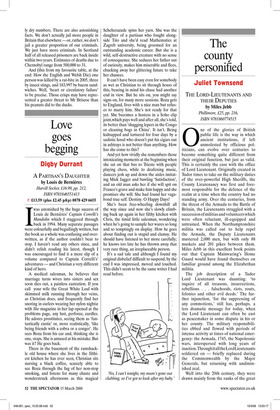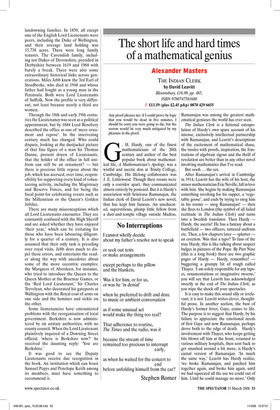The county personified
Juliet Townsend
THE LORD-LIEuTENANTS AND THEIR DEPuTIES by Miles Jebb Phillimore, £25, pp. 216, ISBN 9781860774515 One of the glories of British public life is the way in which ancient institutions, if left unmolested by officious politicians, can evolve over centuries to become something quite different from their original function, but just as valid. This is certainly the case with the office of Lord Lieutenant. Originally created in Tudor times to take on the military duties of the over-powerful High Sheriffs, the County Lieutenancy was first and foremost responsible for the defence of the realm at a time when the country had no standing army. Over the centuries, from the threat of the Armada to the Battle of Britain, the Lieutenants struggled with a succession of militias and volunteers which were often reluctant, ill-equipped and untrained. When the Northamptonshire militia was called out to help repel the Armada, the Deputy Lieutenants mustered 2,000 men, but with only 88 muskets and 201 pikes between them. Miles Jebb in this excellent book points out that Captain Mainwaring’s Home Guard would have found themselves on familiar ground among the Elizabethan militia.
The job description of a Tudor Lord Lieutenant was daunting: ‘to inquire of all treasons, insurrections, rebellions . . . falsehoods, riots, routs, felonies and other evil deeds.’ The further injunction, ‘for the suppressing of any commotions,’ still has, perhaps, a less dramatic message for today, when the Lord Lieutenant can often be cast as peacemaker in some dispute in his or her county. The military responsibilities ebbed and flowed with periods of intense activity at times of national emergency: the Armada, 1745, the Napoleonic wars, interspersed with long years of inaction. Through it all the Lord Lieutenants soldiered on — briefly replaced during the Commonwealth by the Major Generals, but returning with undiminished zeal.
Well into the 20th century, they were drawn mainly from the ranks of the great landowning families. In 1850, all except one of the English Lord Lieutenants were peers, including the Duke of Wellington, and their average land holding was 15,738 acres. There were long family tenures. The Cavendish family, including ten Dukes of Devonshire, presided in Derbyshire between 1619 and 1968 with barely a break. There were also some extraordinary historical links across generations. Miles Jebb knew the 3rd Earl of Stradbroke, who died in 1948 and whose father had fought as a young man in the Peninsula. Both were Lord Lieutenants of Suffolk. Now the profile is very different, not least because nearly a third are women.
Through the 18th and early 19th centuries the Lieutenancy was seen as a political appointment, but by 1884 Lord Rosebery described the office as one of ‘mere ornament and repose’. In the intervening century much has changed. Who could dispute, looking at the dustjacket picture of that fine figure of a man Sir Thomas Dunne, present doyen of Lieutenants, that the holder of the office in full uniform can still be an ornament? — but there is precious little repose about the job, which has accrued, over time, responsibility for supporting every kind of volunteering activity, including the Magistracy and Reserve Forces, and for being the focal point for celebrating events such as the Millennium or the Queen’s Golden Jubilee.
There are many misconceptions which all Lord Lieutenants encounter. They are constantly confused with the High Sheriff and are asked whether they have enjoyed ‘their year,’ which can be irritating for those who have been labouring diligently for a quarter of a century. It is also assumed that their only task is presiding over royal visits. Jebb does much to dispel these errors, and entertains the reader along the way with anecdotes about some of the more eccentric examples; the Marquess of Aberdeen, for instance, who tried to introduce the Queen to the Queen Mother at the Braemar Games, or the ‘Red Lord Lieutenant,’ Sir Charles Trevelyan, who decorated his gateposts at Wallington with the Royal coat of arms on one side and the hammer and sickle on the other.
Some lieutenancies have encountered problems with the reorganisation of local government. Berkshire is now administered by six unitary authorities, with no county council. When the Lord Lieutenant plaintively inquired of a Downing Street official, ‘where is Berkshire now?’ he received the daunting reply: ‘You are Berkshire.’ It was good to see the Deputy Lieutenants receive due recognition in the book. An institution which can boast Samuel Pepys and Penelope Keith among its members, must have something to recommend it.



























































































 Previous page
Previous page